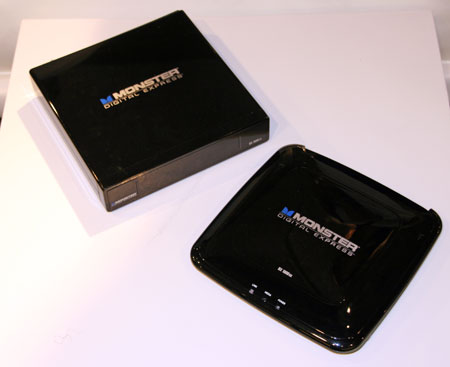Lotsa Monster

Although they was announced last year, Monster's PowerNet products were demonstrated at the show and are expected to ship next month. These products are designed to transport audio/video streams using TCP/IP networking protocol over a home's powerlines and can currently support four to five HD streams. The PLN100 ($200/pair) provides one Ethernet port on each unit, which plugs into any AC outlet, while the PLN200 ($300/pair, left in photo above) adds two AC outlets to compensate for the one lost to the unit itself. The PLN300 ($200 each, right in photo above) offers four Ethernet ports along with two AC outlets.

Wireless HDMI is all the rage these days, and Monster's Digital Express Wireless HD system capitalizes on this trend using UWB (Ultra Wideband) technology to transmit an HDMI signal as far as 30 to 50 feet, and it can even pass through one wall. The transmitter can accommodate five sources, including two HDMI, two component, and one composite or S-video as well as coax and optical digital audio. The entire A/V signal can also be sent via coax to as many as 40 receivers—one at a time at 1080p or multiple destinations simultaneously at 1080i or less, which lets you start a show in one room and finish it in another. The receiver has an IR sensor and sends remote commands back to the transmitter. One transmitter/receiver pair will cost $1000, and each additional receiver will be another $400; the system should be shipping by September.

Perhaps most intriguing was the Super Thin HDMI cable, which has 85% less copper than a conventional cable. A tiny chip in the receiver end boosts the signal to compensate for signal losses, and it's self-powered, actually "harvesting" the energy it needs to operate from the signal itself. This little gem was developed by an Irish company called Redmere, and it can carry up to 10.2Gbps as far as 4 meters.
























































